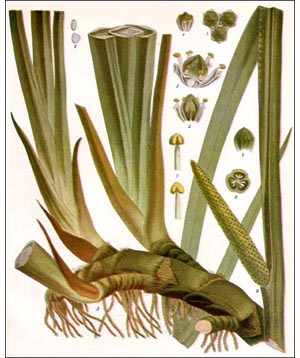
The sweet flag
When I was researching the history of gays during the Civil War period, the first info that popped up was Walt Whitman. I knew that there were questions about his sexual activity, but I hadn't delved too deeply into it. As I was perusing one particular site, (unfortunately not available at this time!), I came across the reference to his calamus poems and that was the aha moment!
I had my title, The Sweet Flag, also known as the calamus root and the main ingredient for the alukah potion that is the linch pin of the story.
Presented for your trivia collection: Drugs
The Middle Ages
Castles and manor houses often smelled damp and musty. To counteract this, herbs and rushes were strewn across the floors. Lavender and thyme; meadowsweet and marjoram; germander and hyssop were all popular and if the house owner was wealthy enough - the stems and leaves of the Sweet Flag (Acorus calamus) which grew only in the Fenlands of Norfolk and Cambridge and the low-lying countries of Europe.
Before the advent of alcohol based toilet waters in the 14th century, our clean and well-mannered Medieval man or woman could have finished their ablutions with a dusting of powder on the face and/or the body. These were made from rice powder, ground orris root or ground calamus root and mixed with various ground spices and herbs including cloves, dried rose petals and lavender
It grows in swamps, marshes, and very moist places. It is a herbaceous perennial growing from spreading, fleshy rhizomes. The long, sword-like, deep green pointed leaves grow up from the rhizomes. Calamus has ever been a favorite popular remedy. Its principal use seems to have been that of a tonic and blood purifier, for which purpose bits of the dried rhizomes are masticated and the saliva swallowed. It undoubtedly is a tonic...Chewing the rhizomes is also said to clear the voice.
Calamus is, or has been, used in flavoring beer and gin. Country people add it to whisky, wine, and brandy to make a tonic bitters for the weak and dyspeptic. It is said that the Turks employ it as a preventive against contagious diseases.
It is considered as a stimulating, aromatic, and bitter tonic.
When I concocted the alukah potion, I took information from what I learned about the medicinal qualities and that was the base for the brew.











No comments:
Post a Comment